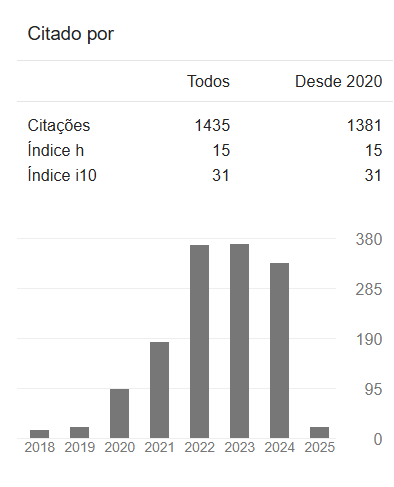SIMULATED JURY AND PHILLIPS 66: TEACHING STRATEGIES WITH STUDENTS FROM SECOND YEAR OF HIGH SCHOOL
DOI:
10.23926/RPD.2526-2149.2017.v2.n2.p179-196.id75Keywords:
Teaching Strategies, Simulated jury, Phillips 66, Mathematical learningAbstract
This article presents the activities developed with students from the 2nd grade of a public school in Vale do Taquari-RS, seeking the construction of knowledges linked to the use of teaching strategies, Simulated Jury and Phillips 66, in the Mathematics classes. In this perspective, this report aims to socialize the activities that were developed, trying to demonstrate that teaching strategies can make classes more attractive, provide group work, promote autonomy and dialogue, using real or simulated experiences, aiming to solve challenges and promote their own knowledge. The data were recorded through questionnaires, observations and recordings of the socializations. During the Simulated Jury activity, students took the place of prosecutors and lawyers, visualizing, interpreting and analyzing situations in order to defend or accuse, according to given guidelines. In the Phillips strategy 66, and not unlike the previous one, they succeeded in making Mathematics, which is apparently complex, a visible, pleasant, challenging, and understandable science. It is also highlighted that the results exceeded expectations.
Downloads
Metrics
References
ANASTASIOU, Léa das Graças Camargos; ALVES, Leonir Pessate. Estratégias de ensinagem. In: ANASTASIOU, Léa das Graças Camargos; ALVES, Leonir Pessate. (Orgs.). Processos de ensinagem na universidade. Pressupostos para as estratégias de trabalho em aula. 3. ed. Joinville: Univille, 2004. p. 67-100.
BARROSO, T. O desenvolvimento do discurso argumentativo por crianças do ensino fundamental: articulação e coordenação de sequências argumentativas no texto de opinião. Revista de Estudos Linguísticos Veredas, Juiz de Fora, v. 11, n. 2, 2/2007, p. 101-117
BERBEL, Neusi Aparecida Navas. As metodologias ativas e a promoção da autonomia do estudante. Seminário de Ciências Sociais e Humanas, Londrina, v. 32, n. 1, p. 25-40. Jan./jun.2011.
D' AMBRÓSIO, U. Matemática, ensino e educação: uma proposta global. Temas & Debates, São Paulo, v.4, n.3, p. 1 a 16, 1991.
DANTE, L. R. Didática da resolução de problemas de matemática. São Paulo: Ática, 1998.
FREIRE, Paulo. Pedagogia do oprimido. São Paulo: Paz e Terra, 1996.
GADOTTI, M. História das ideias pedagógicas. 8. ed. São Paulo: Ática, 2001.
LUCKESI, Cipriano Carlos. Filosofia da educação. São Paulo: Cortez, 1994.
MASETTO, Marcos T. Competências pedagógicas do professor universitário. São Paulo: Summus, 2003.
MASETTO, Marcos T. Didática: a aula como centro. 4ª ed. São Paulo: FTD, 1997.
PONTE, J. P.; BROCADO, J.; OLIVEIRA, H. Investigações Matemáticas na sala de aula. Belo Horizonte, Autêntica, 2009.
REDLING, J. P.; JUNIOR, J. L. Trilhas pedagógicas, v. 1, n. 1. Ago. 139 2011(p. 122-139).
SCARPATO, Marta Scarpato. Procedimento de Ensino: Um Ato de Escolha na Busca de uma Aprendizagem Integral. In Scarpato, Marta (org.). Os Procedimentos de Ensino Fazem a Aula Acontecer, São Paulo: Avercamp, 2006.
Downloads
Published
How to Cite
Issue
Section
License
Copyright (c) 2023 A Revista Prática Docente tem o direito de primeira publicação

This work is licensed under a Creative Commons Attribution-NonCommercial 4.0 International License.
Authors who publish in this journal agree to the following terms:
- Authors retain the copyright and grant the journal the right of first publication, with the paper simultaneously licensed under the Licença Creative Commons Attribution allows the sharing of the work with acknowledgment of authorship and initial publication in this journal.
- Authors are authorized to take additional contracts separately, for non-exclusive distribution of the version of the work published in this journal (e.g. publish in institutional repository or as a book chapter), with acknowledgment of authorship and initial publication in this journal.











